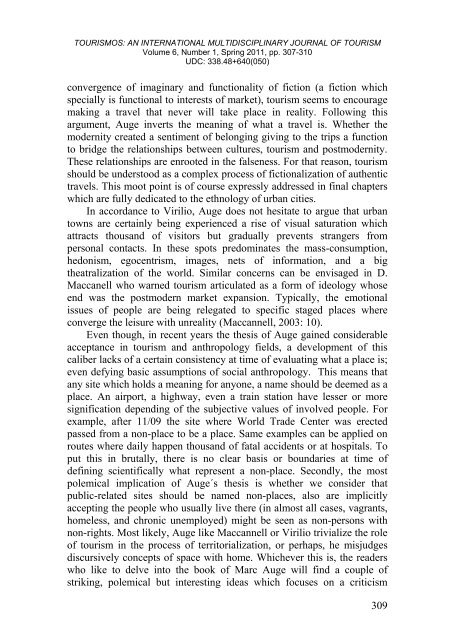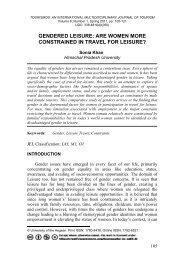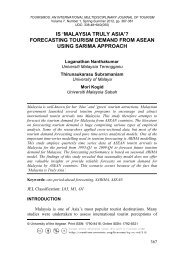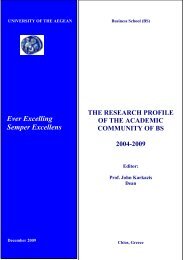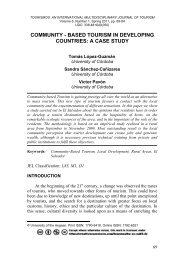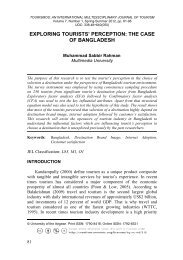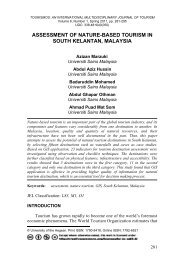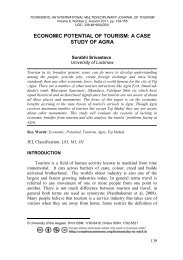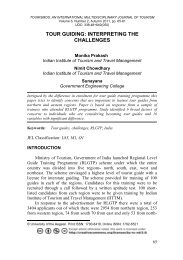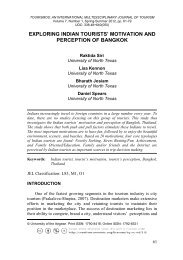TOURISMOS is an international, multi-disciplinary, refereed (peer ...
TOURISMOS is an international, multi-disciplinary, refereed (peer ...
TOURISMOS is an international, multi-disciplinary, refereed (peer ...
You also want an ePaper? Increase the reach of your titles
YUMPU automatically turns print PDFs into web optimized ePapers that Google loves.
<strong>TOURISMOS</strong>: AN INTERNATIONAL MULTIDISCIPLINARY JOURNAL OF TOURISM<br />
Volume 6, Number 1, Spring 2011, pp. 307-310<br />
UDC: 338.48+640(050)<br />
convergence of imaginary <strong>an</strong>d functionality of fiction (a fiction which<br />
specially <strong>is</strong> functional to interests of market), tour<strong>is</strong>m seems to encourage<br />
making a travel that never will take place in reality. Following th<strong>is</strong><br />
argument, Auge inverts the me<strong>an</strong>ing of what a travel <strong>is</strong>. Whether the<br />
modernity created a sentiment of belonging giving to the trips a function<br />
to bridge the relationships between cultures, tour<strong>is</strong>m <strong>an</strong>d postmodernity.<br />
These relationships are enrooted in the falseness. For that reason, tour<strong>is</strong>m<br />
should be understood as a complex process of fictionalization of authentic<br />
travels. Th<strong>is</strong> moot point <strong>is</strong> of course expressly addressed in final chapters<br />
which are fully dedicated to the ethnology of urb<strong>an</strong> cities.<br />
In accord<strong>an</strong>ce to Virilio, Auge does not hesitate to argue that urb<strong>an</strong><br />
towns are certainly being experienced a r<strong>is</strong>e of v<strong>is</strong>ual saturation which<br />
attracts thous<strong>an</strong>d of v<strong>is</strong>itors but gradually prevents str<strong>an</strong>gers from<br />
personal contacts. In these spots predominates the mass-consumption,<br />
hedon<strong>is</strong>m, egocentr<strong>is</strong>m, images, nets of information, <strong>an</strong>d a big<br />
theatralization of the world. Similar concerns c<strong>an</strong> be env<strong>is</strong>aged in D.<br />
Macc<strong>an</strong>ell who warned tour<strong>is</strong>m articulated as a form of ideology whose<br />
end was the postmodern market exp<strong>an</strong>sion. Typically, the emotional<br />
<strong>is</strong>sues of people are being relegated to specific staged places where<br />
converge the le<strong>is</strong>ure with unreality (Macc<strong>an</strong>nell, 2003: 10).<br />
Even though, in recent years the thes<strong>is</strong> of Auge gained considerable<br />
accept<strong>an</strong>ce in tour<strong>is</strong>m <strong>an</strong>d <strong>an</strong>thropology fields, a development of th<strong>is</strong><br />
caliber lacks of a certain cons<strong>is</strong>tency at time of evaluating what a place <strong>is</strong>;<br />
even defying basic assumptions of social <strong>an</strong>thropology. Th<strong>is</strong> me<strong>an</strong>s that<br />
<strong>an</strong>y site which holds a me<strong>an</strong>ing for <strong>an</strong>yone, a name should be deemed as a<br />
place. An airport, a highway, even a train station have lesser or more<br />
signification depending of the subjective values of involved people. For<br />
example, after 11/09 the site where World Trade Center was erected<br />
passed from a non-place to be a place. Same examples c<strong>an</strong> be applied on<br />
routes where daily happen thous<strong>an</strong>d of fatal accidents or at hospitals. To<br />
put th<strong>is</strong> in brutally, there <strong>is</strong> no clear bas<strong>is</strong> or boundaries at time of<br />
defining scientifically what represent a non-place. Secondly, the most<br />
polemical implication of Auge´s thes<strong>is</strong> <strong>is</strong> whether we consider that<br />
public-related sites should be named non-places, also are implicitly<br />
accepting the people who usually live there (in almost all cases, vagr<strong>an</strong>ts,<br />
homeless, <strong>an</strong>d chronic unemployed) might be seen as non-persons with<br />
non-rights. Most likely, Auge like Macc<strong>an</strong>nell or Virilio trivialize the role<br />
of tour<strong>is</strong>m in the process of territorialization, or perhaps, he m<strong>is</strong>judges<br />
d<strong>is</strong>cursively concepts of space with home. Whichever th<strong>is</strong> <strong>is</strong>, the readers<br />
who like to delve into the book of Marc Auge will find a couple of<br />
striking, polemical but interesting ideas which focuses on a critic<strong>is</strong>m<br />
309


